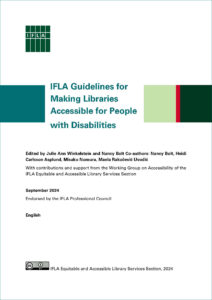Just published: IFLA Guidelines for Making Libraries Accessible for People with Disabilities
27 January 2025
 Making libraries accessible and welcoming for everyone
Making libraries accessible and welcoming for everyone
In 2005, the IFLA Equitable and accessible Library Services Section (previously Library Services to People with Special Needs Section) published “Access to Libraries for Persons with Disabilities: A Checklist”. While valuable in basic advice, much has happened over the almost two decades in the library community and in services to people with disabilities. There has been notable progress in the field of library services to persons with disabilities, particularly in the areas of assistive technology, electronic formats, and online communication tools, such as: the language related to the lives of persons with disabilities has evolved in this period; for example, people-first language versus identity-first language and also user groups with cognitive disabilities were not included in the previous guidelines.
New and updated IFLA Guidelines for Making Libraries Accessible for People with Disabilities provide basic ideas and strategies on how to make libraries accessible. They include universal design, assistive technology, and physical and information accessibility so everyone can use a library’s resources; provide a rights-based approach for library services to all persons with disabilities, based on human rights-related laws, such as the UN Convention on the Rights of Persons with Disabilities; focus on leadership and management in libraries since the direction of library policies is likely under their guidance and control; educate library staff on the wide range of users with disabilities so they can provide appropriate and welcoming services to meet everyone’s needs; provide updates on helpful technologies to promote accessibility through numerous new library practices and innovations; provide easy-to-understand guidelines so librarians without related training or experiences can begin serving all community members well and they contribute to the United Nations 2030 SDGs (Sustainable Development Goals), such as reduced inequalities, good health and well-being, quality education, decent work, and economic growth.
Download
IFLA Guidelines For Making Libraries Accessible For People With Disabilities
These guidelines are a revision of the “Access to Libraries for Persons with Disabilities Checklist,” published in 2005. The original guidelines continue to be useful in libraries, but the climate concerning people with disabilities worldwide has changed significantly since the original publicat...
The main purpose of the guidelines is to serve as a reference for specific groups of people with disabilities and to libraries who provide accessible services for each of the disabilities groups of users. It includes recommendations about community needs assessments, library staff training, use of assistive/adaptive technology, outreach programs, programme proposals, activities and services. This valuable document covers many suggestions and recommendations for library services for people with disabilities and is guided by the motto “nothing about us without us” that reflects the principle that decisions and policies concerning people with disabilities should be made by partnering with disability community. Maela Rakočević Uvodić Chair, IFLA Equitable & Accessible Library Services (EALS) Section